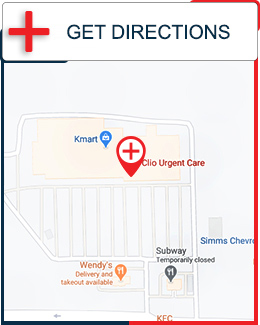Home » Clio MI How EKG Can Impact Health
You cannot copy content of this website, your IP is being recorded
What an EKG Can Tell You About Your Health
An EKG can provide crucial insights into your heart health by detecting irregularities and potential issues early. Understanding the results of an electrocardiogram can help you take proactive steps toward better cardiovascular health. At Clio Urgent Care, our experienced team is dedicated to offering thorough EKG tests and expert advice tailored to your needs. Whether you’re experiencing symptoms or seeking a routine check-up, we’re here to ensure you get the care and attention you deserve. For more information, please contact us or simply walk in! You can also schedule your appointment online. We are conveniently located at 4272 W. Vienna Road Clio, MI 48420.

Additional Services We Offer

Additional Services We Offer







